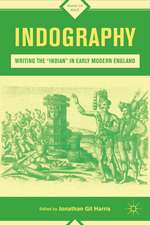Consuming Behaviours: Identity, Politics and Pleasure in Twentieth-Century Britain
Editat de Erika Rappaport, Sandra Trudgen Dawson, Mark J. Crowleyen Limba Engleză Hardback – 30 iul 2015
| Toate formatele și edițiile | Preț | Express |
|---|---|---|
| Paperback (1) | 249.12 lei 6-8 săpt. | |
| Taylor & Francis – 30 iul 2015 | 249.12 lei 6-8 săpt. | |
| Hardback (1) | 764.20 lei 6-8 săpt. | |
| Taylor & Francis – 30 iul 2015 | 764.20 lei 6-8 săpt. |
Preț: 764.20 lei
Preț vechi: 1027.40 lei
-26% Nou
Puncte Express: 1146
Preț estimativ în valută:
146.24€ • 151.82$ • 121.95£
146.24€ • 151.82$ • 121.95£
Carte tipărită la comandă
Livrare economică 22 martie-05 aprilie
Preluare comenzi: 021 569.72.76
Specificații
ISBN-13: 9780857856111
ISBN-10: 0857856111
Pagini: 320
Ilustrații: 30 bw illus
Dimensiuni: 156 x 234 x 18 mm
Greutate: 0.45 kg
Ediția:1
Editura: Taylor & Francis
Colecția Routledge
Locul publicării:Oxford, United Kingdom
ISBN-10: 0857856111
Pagini: 320
Ilustrații: 30 bw illus
Dimensiuni: 156 x 234 x 18 mm
Greutate: 0.45 kg
Ediția:1
Editura: Taylor & Francis
Colecția Routledge
Locul publicării:Oxford, United Kingdom
Cuprins
1. Introduction: Consuming Behaviours: Identity, Politics and Pleasure in Twentieth-Century BritainErika D. Rappaport, University of California, Santa Barbara, USA; Sandra Trudgen Dawson, Northern Illinois University, USA; Mark J. Crowley, Wuhan University, ChinaPart I: Gender, Sexuality and Youth: Cultivating and Managing New Consumers2. Who is the Queer Consumer? Historical Perspectives on Capitalism and HomosexualityJustin Bengry, Birkbeck, University of London, UK3. 'Healthier and Better Clothes for Men': Men's Dress Reform in Interwar BritainIna Zweiniger-Bargielowska, University of Illinois, USA4. Selling, Consuming and Becoming the Beautiful Man in Britain: The 1930s and 1940s Paul Deslandes, University of Vermont, USA5. Rational Recreation in the Age of Affluence: The Café and Working-Class Youth in London, c.1939-1965 Kate Bradley, University of Kent, UK6. Teenagers, Photography and Self-fashioning: 1956-1965Penny Tinkler, University of Manchester, UK7. Unwanted Consumers: Violence and Consumption in British Football in the 1970s Brett Bebber, Old Dominion University, USAPart II: In and Beyond the Nation: The Local and the Global in the Production of Consumer Cultures8. Consumer Communication as Commodity: British Advertising Agencies and the Global Market for Advertising 1780-1980Stefan Schwarzkopf, Copenhagen Business School, Denmark9. Drink Empire Tea: Conservative Politics and Imperial Consumerism in Interwar BritainErika D. Rappaport, University of California, Santa Barbara, USA10. Female Credit Customers, the United Africa Company, and Consumer Markets in Postwar Ghana, Bianca Murillo, Willamette University, USA11. Designing Consumer Society: Citizens and Housing Plans during the Second World War, Sandra Trudgen Dawson, Northern Illinois University, USA12. Saving for the Nation: The Post Office and National Consumerism: c.1860-1945Mark J. Crowley, Wuhan University, China13. Prosperity for All? Britain and Mass Consumption in Western Europe after the Second World WarKenneth Mouré, University of Alberta, Canada14. A House Divided: The Organized Consumer and the British Labour Party, 1945-60 Peter Gurney, University of Essex, UK15. Early British Television: The Allure and Threat of AmericaKelly Boyd, Institute of Historical Research, University of London, UKBibliographyIndex
Notă biografică
Erika Rappaport is an Associate Professor of History at the University of California, Santa Barbara, USA. Sandra Trudgen Dawson is an Instructor of History and Women's Studies at Northern Illinois University,USA. Mark J. Crowley is an Associate Professor in the School of History, Wuhan University, China.
Recenzii
"This is an outstanding collection of essays ... that should be required reading for both academics and students, for the sheer consistency of its scholarship and ambition across no fewer than fifteen chapters ... [It] is a fascinating and thought-provoking collection that will undoubtedly be read widely for years to come. - The English Historical ReviewA historical approach to culture and consumerism is a necessary ingredient to understanding contemporary life in a modern Western society like Britain, and anthropologists interested in capitalism, consumption, and modern lifestyles can benefit greatly from this country-specific investigation of politics, gender, pleasure, and the more or less intentional construction of an enduring modern subjectivity. - Anthropology Review DatabaseThe best essays in this collection explore... and collectively illustrate the imaginative work that can still be undertaken in the study of consumer culture in modern Britain. - Journal of Modern History"
Descriere
In twentieth-century Britain, consumerism increasingly defined and redefined individual and social identities. New types of consumers emerged: the idealized working-class consumer, the African consumer and the teenager challenged the prominent position of the middle and upper-class female shopper.

























